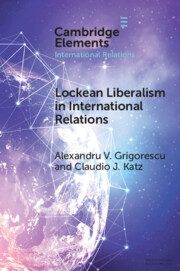Element contents
Lockean Liberalism in International Relations
Published online by Cambridge University Press: 13 March 2024
Summary
- Type
- Element
- Information
- Online ISBN: 9781009516952Publisher: Cambridge University PressPrint publication: 04 April 2024
References
- 2
- Cited by

